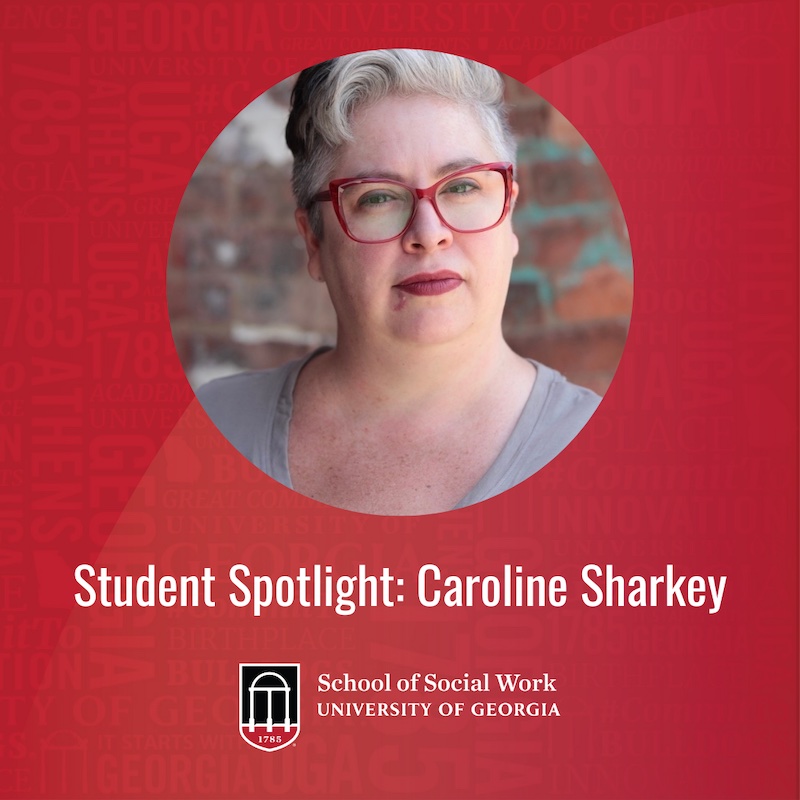by Thomas Ehlers
Caroline Sharkey stays busy.
The doctorate candidate at the University of Georgia’s School of Social Work balances her coursework while being a psychotherapist, the clinical supervisor of Project Family – a community healthcare organization offering mental health services to kids through adults – and a mother to three kids.
A first-generation college student, Sharkey earned her associate’s degree when she graduated high school thanks to dual-enrollment classes and went on to obtain a bachelor’s degree in history and English from Ithaca College in New York. They then went to a graduate program at University College Cork, Ireland, to study Medieval Studies and Ecclesiastical Law.
Their degree allowed her to teach at The Free School, an independent, alternative school in Albany, N.Y., for six years before they spent seven as the school’s executive director. Several experiences at the school made her realize a different calling.
“During that time, I realized as an educator that a great portion of the work I was doing was social work,” Sharkey said. “Meeting kids’ needs was not just academic at this point. I realized I needed to pursue a new career. I wanted a change of pace, and I also was getting excited about this idea of what it was to be a social worker.”
Sharkey saw first-hand the impact social workers could have from interactions with the school’s social worker. In 2013, she and her family packed their things and moved to Athens, where Sharkey started her master’s degree in social work, earning that degree two years later.
This diploma allowed her to begin her career as a social worker. She hit the ground running, becoming a project manager at Advantage Behavioral Health – the Athens organization provides treatment and support to individuals and families facing behavioral challenges, intellectual or developmental disabilities and addictive diseases – before being named the Director of Youth Services at the same organization. During their tenure, she oversaw a number of competitive grants.
But becoming a tenure-track professor was her long-term goal. Sharkey began the doctoral program in 2019, and she quickly found a topic of research. However, the COVID-19 pandemic had other plans.
“At first, my primary focus was to home in on school mass shootings and gun violence,” they said. “While I am still very much committed to that work and do engage in that work, the sobering reality of the world shutting down six months into my doctorate made it unrealistic to do my research in schools since they weren’t open.”
But she pivoted. Sharkey changed topics, which ended up bringing her back to upstate New York.
“I went back to Albany, went back to that very same neighborhood,” said Sharkey. “I lived there for about seven weeks, and I conducted an in-person chronicle of a digital storytelling and filmmaking program with young people between the ages of 10 and 24 in Albany’s south end – it’s actually a block-and-a-half from where I lived.”
Her research, which is in its analysis and dissertation writing phase, is “the most profound professional experience” that she has gained in her life. She studied the idea of collective efficacy, which she describes as when a community or group of people realize they have a willingness to intervene with a problem and work together to create a social change.
“I just sat and observed and built relationships and watched a group of young people come together – many of them had never met before,” she said. “There’s every reason to think that they have more disadvantages than advantages, but my experience was the exact opposite. They built a community in a matter of days, they established trust, and they taught each other skills.”
Aside from analyzing their research, she sees 35 clients weekly. She’s participated in many research projects and peer-reviewed publications. Another passion of hers is trauma-informed training.
Although she currently gives seminars as a contractor, she helped facilitate these trainings with Trauma-Informed Library Transformation (TILT), a collaboration between the Athens-Clarke County Library and the UGA School of Social work to give libraries resources to welcome, respect and help trauma victims.
With the many special titles she holds – student, mother, partner, social worker – being a researcher helps her live her true self. And as she completes her research and prepares for their dissertation defense, she will enjoy digging into the data.
“I feel authentic as a researcher,” she said. “It truly makes me happy. I look forward to my research. I don’t always look forward to the work around it. But I really look forward to it and am genuinely disappointed when I don’t have enough time to do all that I want to do with research.”

